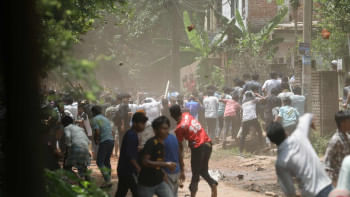'Shoot to kill' ordered as Kyrgyz clashes spread
Deadly ethnic clashes across the south of Kyrgyzstan raged for a third day yesterday, as the embattled interim government ordered police to shoot to kill gangs of marauders terrorizing the population.
At least 97 people have been killed and more than 1,200 wounded, the health ministry said on Sunday. The previous death toll stood at 86.
Since Thursday evening, "97 people have died in the Osh and Jalalabad regions" during clashes between ethnic Kyrgyz and ethnic Uzbek groups, the ministry said.
Another 1,247 had been wounded in the violence, according to their latest figures.
On Saturday, Kyrgyzstan ordered the partial mobilisation of the army after nearly three days of deadly clashes and gave security forces shoot-to-kill orders against any groups using firearms.
Interim President Roza Otunbayeva earlier appealed to Moscow to intervene militarily, but with Moscow declining to send troops and the violence showing no signs of abating in the Central Asian state, calls from foreign leaders and aid groups to end the brutal clashes have gained urgency.
The government decreed late Saturday that lethal force would now be authorised to protect civilians.
"If we do not take opportune and effective measures the unrest could become much more serious and descend into a regional conflict," it said in the decree.
It tightened a state of emergency to a 24-hour curfew in the southern Osh region, where the violence erupted Thursday when brawls between ethnic Kyrgyz and Uzbeks flared into running street battles across Osh city.
Authorities also extended the emergency rule Sunday across the country's entire southern Jalalabad region as heavy fighting spread there from neighbouring Osh, leaving at least 11 people dead, officials said.
Panicked residents described ongoing violence in the region, where the International Committee of the Red Cross (ICRC) warned of a humanitarian crisis.
"The authorities are not doing anything to stabilize the situation.... We are not even able to collect bodies from the streets," Ruslan, an Osh resident who preferred not to give his surname, said by telephone.
"The truth and the enormity of the tragedy cannot be hidden. The city centre is under the control of bandits."
In Jalalabad, where the worst of the fighting now appears to be centred, local resident Sergei Kim, described chaotic scenes with gun battles throughout the city.
"There are shoot-outs going on in the streets and many people. A gang is moving in the direction of the university," he said.
Smoke hung over the city as fires raged in several buildings, another local resident, journalist Zhalil Saparov, told AFP.
"There is a veil of smoke covering the whole city," he said.
Rights group Amnesty International called on authorities to protect citizens "of Uzbek origin who have been targeted during the violence".
It urged neighbouring Uzbekistan to take in refugees, saying between 2,000-6,000 refugees had fled to the border, desperate to escape the violence.
"Things are getting worse and worse by the hour," said Severine Chappaz, the deputy head of the ICRC mission in Kyrgyzstan.
"Tens of thousands of people are fleeing the fighting and looting and heading towards the Kyrgyz border with Uzbekistan.”
An AFP reporter witnessed hundreds of ethnic Uzbek women and children hoping to be allowed in Uzbekistan at one border post.
Uzbekistan has voiced "extreme alarm" over the situation, calling it an organized bid to inflame ethnic tensions, but has not said whether it will accept refugees.
The European Commission Saturday announced it was sending a humanitarian expert to evaluate the situation, while Moscow pledged swift medical aid.
The provisional government has so far failed to impose order in the Central Asian state since coming to power during deadly riots that ousted President Kurmanbek Bakiyev in April.

 For all latest news, follow The Daily Star's Google News channel.
For all latest news, follow The Daily Star's Google News channel. 



Comments